Politics and Government: Zionism

Janette Fishenfeld
Janette Fishenfeld was a Brazilian author, columnist, and Zionist. In her works, she portrayed a nuanced, complex view of the Brazilian Jewish community and advocated for the Zionist cause.

Gisi Fleischmann
Gisi Fleischmann was a steadfast and brave fighter in the underground resistance to Nazism during World War II. Many times, she refused to escape Slovakia to safety and instead chose to stay and fight for her people to the bitter end.

Flora Benenson Solomon
Flora Benenson Solomon’s deep commitments to welfare and Zionism traversed geographical boundaries and social groups. From her efforts to improve the lives of Jewish and Arab communities in Palestine to the her work on behalf of garment workers in England, Solomon maintained an unwavering commitment to Zionism, which acted as a sustainer of Jewish identity in England.
Sarah Feiga Meinkin Foner
Born into a family that encouraged her love of Jewish learning, Sarah Foner asked to learn Hebrew when she was only five years old and published her first novel in her twenties. During her lengthy writing career, Foner’s publications often reflected her interest in Jewish and women’s issues and centered notably independent female characters.

Modern France
From the French Revolution to the twenty-first century, Jewish women in France have undergone radical legal, political, cultural, and religious transformations. Seizing upon the increasing number of opportunities available to them, both as Jews and as women, Jewish women have left their marks on all areas of French society.
Lee Weiss Frank
Lee Weiss Frank worked as a reporter and radio show host, was involved in the Women’s International League for Peace, and was a prominent public figure in Philadelphia. Her legacy extends beyond her community work and journalism, as she was a prolific artist painting in oil and in watercolor.

Recha Freier
German-born Recha Freier founded Youth Aliyah in 1933, which assisted in sending Jewish European teenagers to Palestine prior to World War II to be trained as agricultural pioneers on kibbutzim. Although she was responsible for saving the lives of many thousands of Jewish youth, Freier’s efforts were not officially acknowledged until 1975, when she was eighty-three years old.

Lillian Freiman
Lillian Freiman was unquestionably the most prominent Jewish woman in Canada in the interwar period. Freiman was exemplary for her degree of independent social activism and devotion to an array of Jewish and non-Jewish social causes.

Miriam Freund-Rosenthal
Charlotte Friend
Cell biologist and immunologist Charlotte Friend discovered a virus that could transmit leukemia and made major contributions to our understanding of cancer and its causes. She served as director of the Center for Experimental Cell Biology at Mount Sinai Medical School, and later as the president of the New York Academy of Sciences and the American Association for Cancer Research.
Ruth Bernard Fromenson
Frieda Fromm-Reichmann
Frieda Fromm-Reichman was a German-American psychiatrist best known for her innovations in the psychotherapeutic treatment of schizophrenics and manic-depressive patients previously deemed unsuitable for psychoanalysis. Towards the end of her life, Fromm-Reichman received international recognition for her creative and insightful contributions to psychotherapy.

Dora Gad
Dora Gad (1912-2003) was a prominent Israeli architect and interior designer. In the early decades of Israel's statehood, Gad played a key role in designing projects for the newly established national institutions in Israel. In 1966, she received the Israel Prize in architecture, the first woman to have ever received this prize.
Mamie Gamoran
Ruth Gay
Through her writing, Ruth Glazer Gay captured an engaging view of the Jewish community, both past and present. As a writer, journalist, and archivist, she demonstrated throughout her life the possibility of having an intellectually vibrant career while still accommodating marriage and motherhood.
Sylva Gelber
Sylva Gelber dedicated her life to social work, labor politics, and women’s rights. She was the first student to enroll in Henrietta Szold’s School of Social Work in Jerusalem after immigrating to Palestine in 1932. When she returned to Canada in 1948, Gelber became nationally recognized as as a political advocate for women’s rights.
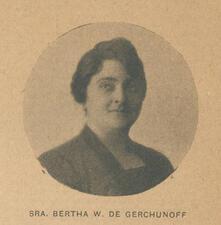
Berta Gerchunoff
Berta Wainstein de Gerchunoff was an Argentine socialist, feminist, and later Zionist leader. As President of the Argentine branch of WIZO, she led an exponential growth of women’s Zionist commitments all over Latin America.
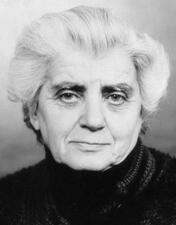
Karen Gershon
Writer and poet Karen Gershon escaped the Holocaust by being sent to England on the Kindertransport. Her best-known book, We Came as Children (1966), documented the collective experiences of refugee children and established her literary reputation in England. Her introspective poetry often reflects on her family and the Holocaust.
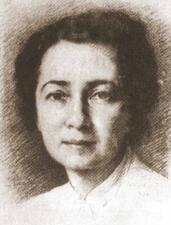
Rosa Ginossar
Rosa Ginossar’s determined lobbying of the British Authority in Palestine won women the right to practice law in Israel.

Katie Gluckmann
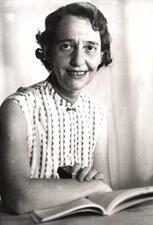
Lea Goldberg
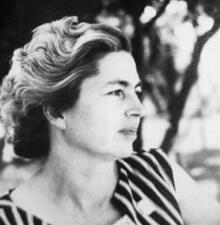
Shulamit Goldstein
A member of the underground militant group Irgun Zeva'i Le'ummi, Shulamit Goldstein became Israel’s first female pilot in the 1930s. Later in life, she also became a nursery school teacher, a poultry farmer, and a fiberglass manufacturer.

Romana Goodman
Romana Goodman (1885-1955) was a staunch feminist and passionate Zionist who helped establish the influential Women’s International Zionist Organization (WIZO) in 1918. During her career, she was also a founding member of the Jewish Women’s League for Cultural Work in Palestine, helped lead several Zionist conferences, and assisted in the creation of the first B’nai B’rith women’s lodge in England in 1919.
Shira Gorshman
A multi-faceted Yiddish writer, Shira Gorshman embodied the vision and struggles of Jewish socialism throughout her long and productive life. Her work encompassed the shtetl of Lithuania, pioneering Palestine, the Soviet experiment, the Holocaust, and finally the return to modern Israel. In all these journeys her characters, many of whom are women, are revealed in their full humanity and individuality.



